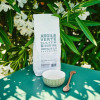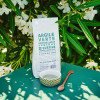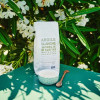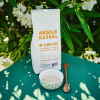Since October, I've got the gums, which retract and I make daily mouthwashs with coconut oil + teeth brushing with rosemary clay toothpaste + 1 drop of essential tea tree oil, but it's no use!!
I've been even testing for a week Buccharom from Pranarom, a specific mixture of essential oils for gums. I also have to try Silagencyl... I specify that I don't do good press, on the contrary, I am just saying that nothing works! My gums retract more and more and the little white balls full of bacteria do not reduce the swelling and come off little by little from my teeth!!! I start to be really concerned.
There are a lot less complicated and especially less violent things, for example a rotation over several weeks:
Week 1 + 2 - clay mouthwashs, morning and evening + 1 clay teeth brushing,
Week 3 + 4 - brushing 1 time/day with 1 teaspoon of bicarbonate and 1 teaspoon of oxygenated water 10% in half a glass of water. Or, soak the brush in oxygenated water then sprinkle it with a pinch of bicarbonate, brush and rinse (less pleasant!) ; not to do for too long in continuous, but rather in rotation, because the bicarbonate is abrasive.
Week 5 + 6 - teeth brushing with lemon, rinse with sodium chloride; also in rotation, because the lemon can not be tolerated for a very long time.
Week 7+8 - mouthwashs with microorganisms morning and evening and swallow.
Week 9 + 10 - mouthwashs, oil pulling, with coconut oil on an empty stomach...
All these ingredients have complementary actions, it's up to you to find the right duration for you.
And also chew raw propolis and do a Xylitol treatment. Obviously what will be suitable for one will not necessarily be the right remedy for another. Eating raw, drinking juices to remineralize the tissues and regain immunity is essential, changing the constitution is the solution to all these symptoms.
I would like to talk about dental hygiene... I have a recurrent beginning of swelling under a tooth.
Here is a solution that has worked dozens of times:
Mix 3 drops of clove essential oil, or: 2 drops of clove EO + 1 drop of lavender EO, with a teaspoon of sweet almond oil; apply to the contaminated place, if necessary with a little brush, if it is between two teeth.
The next day, practice oil pulling.
Start again the day after if you need to.
Depending on the infected state, the length of the infection, the size of the cyst if there is one, it may take several days.
If there is a start of dental cavity, it is different: put the oil mix in the cavity, but ask yourself about the origin of acidification, if it is not sugar, it may be the EBV (Epstein-Barr virus), or a food imbalance but the oil pulling remains valid in all cases.
If it is a beginning of periodontitis, a loss of teeth, follow the protocol I have already indicated above.
What do you advise to clean your teeth daily?
The toothpaste you make yourself, WITHOUT FLUORINE. Weleda laboratory makes good toothpastes but in aluminium tubes, so it's a shame. DENTAVIE toothpaste: 0% of Triclosan, Fluor-sulfate and Titanium Dioxide seems really good and can be purchased in supermarkets.
But look well if there's fluorine, it has to be absolutely avoided, it weakens bone tissues and calcifies the pineal gland. Do we really want that? We can question ourselves.
Why physiological serum is antimicrobial? Is it because of the salt charge?
It's the RIGHT quantity in salt, the more it digs, it burns the tissues, and the less it is without effect.
Apparently it doesn't kill but trap the microbes. Is it true?
It disinfects, stops any acidification of the tissue, both in the digestive mucous membranes, mouth (aphtha), esophagus, intestinal walls (diarrhea), liver (nausea, vomiting), as on the skin (red patches, irritations, buttock erythema), in the eyes, in the wounds.
Can physiological serum be used as a daily mouthwash? Can it damage the tissues in the long run because of the salt?
No, because 0.9% is precisely the physiological dosage of salt that will counter oral acidity.
Let's talk oil pulling... Can you explain it to me because I feel like no one really knows why it works. It has a thousand properties, it seems...
It absorbs acids and microbes in the mouth.
But a basil infusion with 2 cloves, warmed and infused in 300 ml of water, is also effective, especially after a dental extraction. Use cold, in mouthwashs, morning and evening and after each meal.
Do you recommend to do it every day?
In treatment, if necessary: candidosis, cysts, bleeding gums, periodontitis.
Why on an empty stomach? What does it change if I do it at noon?
It is less essential because the microbial concentration is the most important when we wake up.
Which population use oil pulling?
It's Ayurvedic, so Indian.
It consists of taking a tablespoon of oil or fat in the mouth, and circulating it between your teeth for 15 to 20 minutes.
With the tongue, “push,” then “pull” the oil front and back of the teeth, hence the name “oil pulling”. At the end, spit, preferably in the toilet or in the garden soil, to avoid cloging the pipes of the sink, then brush the teeth normally.
On each of your teeth live 1000 to 100,000 bacteria. They are thousands, of different categories, some being good for health, others not. The bacteria create a "biofilm" on the teeth, a thin layer, which sticks to the surface. It’s the famous dental plaque. It is normal to have a little plate, but if there is too much or of poor quality, it creates multiple problems: bad breath, yellow teeth, inflammation of the gum, dental cavities. When you pass oil on and between the teeth, the bacteria are carried away and dissolve in. So we remove large quantities of bacteria.
Through going between your teeth, the oil mixes with saliva, becomes white and foamy, spitting a part if the mouth is too full. We can do this in the morning or in the evening before we go to bed.
Better choose a vegetable oil. Traditionally, Indians use sesame oil, which tastes good, but contains a quantity of anti-nutrients. Virgin coconut oil may be better, olive oil can also do the trick, a tablespoon is enough, but we can do this with a basil infusion or a clove one, it is effective too.
As coconut oil is solid at room temperature (up to 23°C), it takes a few seconds to completely liquefie in the mouth. It has the advantage of being very rich in lauric acid, a medium chain triglyceride (MCT) capable of destroying viruses, bacteria and yeasts.
Finally, should the dental spaces be cleaned, according to you? If so, how and with what? (I thought of the wood stick.)
No, no wood especially! It is too hard and dangerous, there are very fine brushes, dental floss of course, but you must be able to pull it out and it has to be effective, or any small toothpicks with a caoutchouc curved end, of "GUM" brand. There is the dental jet, effective and without damage. And a new electric toothbrush on Internet, it just came out, it's like a unit full of rotary micro brushes. But I have not tested it.
And lemon, how does it act on the teeth? In treatment or on a daily basis?
it descales and disinfects in depth, in one-time treatment also, so not for too long, because after there may be a temporary porosity of the enamel. If we have sensitive teeth, we feel it.
Otherwise, I test coconut oil in the morning on an empty stomach, and I clearly feel my mouth cleaned. But I'm feeling uncomfortable after that.
If you don’t swallow it, there must be no discomfort, otherwise it is your duo liver/vesicle reacting because it’s overloaded.
Evening teeth brushing with lemon and NaCl rinsing is really very effective, I have less pain in the gums. My oral hygiene has well improved, but lemon, in the long ru, makes me sensitive to it.
This is why the use of lemon is short term, very useful, but punctually.
This article is excerpted from an upcoming book: “Le livre de Vie” on the alchemy of juices: Agnès Durand shares the teaching received for several years revolutionizing the criteria, which supervise our dietary choices and enable to highlight how to access the therapeutic properties of fruit and vegetable combinations, as well as their informational dimension.






